Meet the Class of 2025
International Peace Studies Concentration
The International Peace Studies concentration in the Master of Global Affairs builds sustainable peace and justice through careers in policy analysis and political change, government and organizational leadership, and conflict analysis and transformation. This new cohort of students join a global network of more than 600 master’s graduates addressing violent conflict and peace, human rights and human development, environmental sustainability, and related issues. Students in this concentration are considered Kroc Scholars.
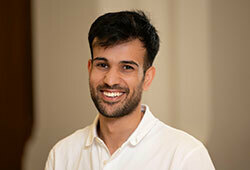
Iqbal Ahmad (Afghanistan) raduated with a BA in political science and public administration from the American University of Afghanistan. He has previously worked at the Ministry of Interior Afghanistan as an analyst, where he focused on national and local police, as well as reforms in the security sector. Later, he worked at Afghan Peace Watch as an editor, providing real-time data on the ongoing conflict and casualties. Iqbal is the recipient of a Kroc Institute Fellowship.
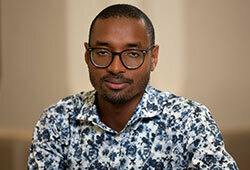
Momodou B. Bah (The Gambia) holds a master of science in management degree from Vrije University Brussels and a BS in political science from the University of The Gambia.
Momodou worked for the West Africa Network for Peacebuilding in The Gambia as a program officer and national early warning systems manager, providing early warning data and collaborating with stakeholders to prevent conflicts. He collaborated closely with local communities, civil society organizations, and government institutions to strengthen The Gambia’s peace architecture. Momodou implemented projects and initiatives that enhanced peace electoral processes and promoted inclusive governance.
Most recently, Momodou worked for the UN Development Programme as a national UN volunteer, serving as aprogram officer supporting the institutional capacity of the Inter Part Committee to facilitate inter-party dialogue, promote peaceful elections, and foster inclusive participation of women in politics and decision-making processes. Momodou is the recipient of a Kroc Institute Fellowship.
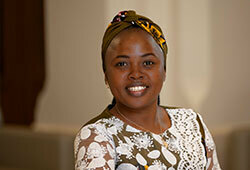
Nanyeni Glory Diotoh (Cameroon) graduated from the University of Buea Cameroon with a bachelor’s degree in international relations and conflict resolution. In 2019, she completed an intensive training on Africans Rising Solidarity on Peace and Mediation, covering conflicts, dealing with complexity and armed forces, and engaging young women in mediation and conflict resolution, conducted at the ActionAid Global platforms in Nairobi Kenya.
After the outbreak of the Cameroon Anglophone crisis in 2016, she began her humanitarian work with, the Foundation for Child Welfare, a a local nonprofit organization, where she worked as a child protection officer.
In 2022, Nanyeni became the Africans Rising regional organizer for engagement in the Central African Region, where she coordinated the activities of movement in all of Central Africa. As a key woman peacebuilder in Cameroon, Nanyeni plans to enhance the women’s peace and security agenda of her country and other countries globally. She is the recipient of a Kroc Institute Fellowship.
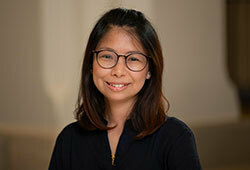
Diana Seng Hkawn (Myanmar), is a counselor who is passionate about trauma healing and resilience building for conflict-affected populations. She has over seven years of experience providing psychosocial support to individuals and groups who suffer from direct and vicarious trauma due to prolonged conflicts in Burma. From 2020 to 2023, she worked in the Mental Health and Psychosocial Support Roster Team of the United Nations Population Fund, Myanmar where she provided mental-health-related training and psychosocial support to humanitarian workers across the country. Moreover, she has also worked with several nongovernmental organizations, including Search for Common Ground, providing training on trauma-informed practice for their staff and community-based volunteers.
Diana holds a master’s degree in counseling from De La Salle University, the Philippines. Her experience of working in conflict settings as a mental health services provider inspires her to explore integration of mental health and psychosocial support interventions in peacebuilding. At the Keough School, she hopes to learn to view issues from multiple perspectives and work across multiple disciplines to become a more effective peacebuilder. Diana is the recipient of a Kroc Institute Fellowship.
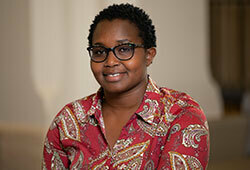
Mercy Jerop (Kenya) is a strong advocate for peace and equality in society. With seven years of experience, she has been dedicated to promoting equal access to education and empowering women to participate in decision-making processes, peacebuilding initiatives, and leadership roles.
Mercy has served as the executive director of Rural Women Peace Link, a grassroots, women-led peace peacebuilding organization responding to the needs of women and girls during conflict and emergencies in Kenya. Her efforts focused on fostering peace, upholding human rights, and advancing gender equality for sustainable development in Kenya.
Mercy’s commitment to promoting peace and humanitarian action led her to participate as a panelist in the Global Women’s Forum for Peace and Humanitarian Action in February 2020, held in Vienna, Austria. During this event, she contributed to setting priorities leading up to the 20th anniversary of the UNSCR 1325 on Women, Peace, and Security. She is a graduate of Moi University in Kenya. Mercy is the recipient of a Kroc Institute Fellowship.
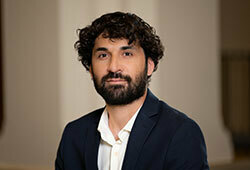
Binar Faeq Karim (Kurdistan Region of Iraq) began working at the age of sixteen in several areas including journalism, media, communications, research and politics. From 2014 to 2017, he helped provide news coverage of the transnational terrorist group known as ISIL for numerous international media in Iraq. Through his work he contributed to media outlets including Newsweek, Vice, and Journalisten, among many others.
Later, Binar’s career path shifted to political media and communications and he worked with EU Election Observation Missions, YouGov, and a deputy prime minister, among others. He then began work in international cooperation and sustainable development, where he held the role of communications and visibility advisor for GIZ, an international development cooperation that works in approximately 120 countries around the globe. Additionally, he has worked remotely for Human Rights Watch, supporting the human rights violations coverage in Iraq. Binar is the recipient of a Kroc Institute Fellowship.
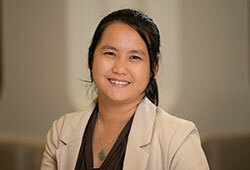
Hay Mar Khaing (Myanmar) is a formally trained teacher with a bachelor’s degree in education from Yangon Institute of Education. She has over five years experience as a teacher in arts and social sciences schools. As a consultant, she delivered several services related to peacebuilding training workshops and curriculum development for local and international organizations in Myanmar. Hay Mar also has worked a curriculum development specialist for Search for Common Ground, an international organization that promotes the peaceful resolution of conflict. Under her leadership, more than 100 local government officials, community leaders, women and youth in Rakhine State have participated in specialized training for peacebuilding and conflict transformation. Hay Mar is a passionate environmental activist and seeks to explore the connection between environmental stewardship and peacebuilding. She is the recipient of a Kroc Institute Fellowship.
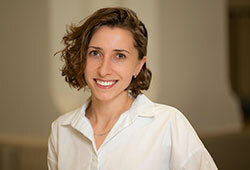
Khrystyna Kozak (Ukraine) holds an LLM in human rights from Ukrainian Catholic University. She recently worked at the United Nations Refugee Agency, focusing on the early recovery of Ukraine during the emergency stage of Russia’s war against Ukraine. Over the past five years, she has dedicated her professional experience to ensuring the legal protection of civilians and promoting accountability to them in international armed conflicts caused by Russia’s invasion of Ukraine. She has conducted numerous research projects to support evidence-based and informed policymaking in this field, with a particular emphasis on the integration of displaced, transitional justice, and related topics.
A native Ukrainian speaker, Khrystyna is also fluent in English and has studied German and Spanish. At the Keough School, her goal is to enhance her soft and hard skills in peacebuilding and conflict resolution, enabling her to make effective contributions in Ukraine. Khrystyna is the recipient of a Kroc Institute Fellowship.

Sara Laine (United States) is a first generation Eritrean-American. Sara has interned at the African Family and Health Organization, studied post-genocide reconciliation and peacebuilding in Rwanda with the School for International Training, and completed a year-long program evaluation fellowship through the Quaker Voluntary Service. Most recently, Sara served as a program manager at Brown Hope, a racial justice nonprofit organization. She speaks Tigrinya and Spanish. Sara earned a BA from Swarthmore College in global political economy and peace and conflict studies. She is the recipient of a Kroc Institute Fellowship.
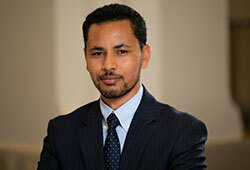
Negalegne Mequanint Mandefiro (Ethiopia) is a career diplomat with a decade of experience in diplomacy and communications. For the last four years he has been working at the Ethiopian Embassy in Washington, DC, mostly in public diplomacy and political affairs. He was head of the public diplomacy section for three years. Negalegne also worked in several departments at Ethiopian’s Foreign Affairs Ministry, including at the office of the Foreign Affairs Minister, the Partnership and Regional Integration Officer at Ethiopia’s Permanent Mission to the African Union, the desk officer for Thailand, Indonesia, and Malaysia, and others. Prior to joining the Ethiopian Foreign Service, he worked as a diplomatic and regional affairs journalist for Ethiopian News Agency, covering major events such as the 2015 Intergovernmental Authority on Development-sponsored South Sudan Peace Talks in Addis Ababa and the 2016 popular youth protest in Ethiopia’s Oromia and Amhara regions that forced the previous longtime governing party to relinquish its power.
Negalegne holds a bachelor’s degree in political science and international relations from Addis Ababa University and a graduate diploma in diplomacy and international affairs from the Ethiopian Foreign Service Institute. After completing his studies, Negalegne aspires to play a pivotal role in promoting sustainable positive peace in Ethiopia and beyond as well as to advance his career in integrated multilateral diplomacy. Negalegne is the recipient of the Kroc Institute Fellowship.
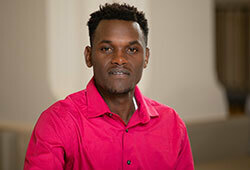
Henri Fabrice Ndayizeye (Burundi) has lived as a Burundian refugee in the Mahama Refugee Camp, located in the Eastern Province of Rwanda, since 2015. He recently graduated with a bachelor’s degree in peacebuilding and development from the Protestant Institute of Arts and Social Sciences (PIASS) in Rwanda. He is the founder of Enough is a Little, an initiative that extends admissions and full-scholarship opportunities in tertiary education to Burundian refugees in Rwanda.
During his studies at PIASS, Fabrice engaged in peacebuilding activities as president of PIASS Peace Club, and as a volunteer co-facilitator of the Alternative to Violence program and Peace Related Concepts training with the Center for Research for Action towards Sustainable Peace and Development. In 2020, Fabrice participated in a one-year study program in Japan, in which he had a chance to intern with the Munakata Foundation. He is also an alumnus of Clinton Global Initiative university (2020), Aspire Leaders Program (2020), and YALI Regional Leadership Center, East Africa (2022).
Fabrice aspires to live and create a world free from violence where the next generations will not become refugees as he did. During his studies at University of Notre Dame, Fabrice is interested in exploring effective means and strategies to create an inclusive world where refugees can have an engaging and inclusive space where they can contribute to conflict prevention and resolution nonviolently in their host country, country of origin, and worldwide. Fabrice is the recipient of the Kroc Institute Fellowship.
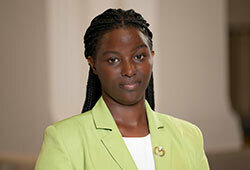
Rebecca Nindorera (Burundi) is passionate about peacebuilding, poverty alleviation, inclusion, and community development. She strongly believes in the potential of youth and women to make a positive impact and lead their communities on a path toward sustainable development. She has more than nine years of experience across various development projects and humanitarian programs and is a qualitative expert in youth and women empowerment programs. Her efforts to empower Burundian youth within their communities led to her selection as a finalist for the 2017 Tanenbaum Peacemaker in Action Award. In June 2017, she was chosen as a fellow pioneer of the African Youth Peace Network, which led to the signing of The Nairobi Declaration on African Youth Connectedness and Participation in the Peaceful Development of Africa Continent.
Rebecca has been a Youth in Action fellow; a delegate at the World Summits of Nobel Peace Laureates and Africa Youth Peace Summits; an alumnus of the YALI Regional Leadership Center; and a fellow at Pan-African conflict mitigation centers in Arusha and South Africa. Recently, she worked as a coordination and reporting officer for the UN peacekeeping mission in the Central African Republic. She holds a bachelor of arts from the École Normale Supérieure. Rebecca is the recipient of a Kroc Institute Fellowship.
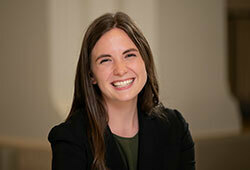
Megan Reamy (United States) graduated summa cum laude from George Fox University in 2021, earning bachelor’s degrees in international studies and sociology and a minor in politics. As a student, she studied in Amman, Jordan and worked with female Syrian refugees to develop economic empowerment initiatives. Along with a love for the Middle East, Megan has a passion for fostering understanding and relationships through dialogue and data. Her research and professional interests include peacebuilding in the Middle East, experimental peacebuilding methodologies, and women’s roles in peacebuilding initiatives. Most recently, Megan was awarded a Fulbright research grant in Kuwait where she collaborated with local organizations and the International Labour Organization to explore the relationships between female employers and female, live-in domestic workers. Together, they developed and piloted dialogue-driven programming for female employers. Megan is the recipient of a Kroc Institute Fellowship.

Maria Camila Salamandra Arriaga (Colombia) is a Colombian lawyer and a current Fulbright Scholar. She belongs to the Afro-descendant women’s group called “Colectivo Wiwas,” which works on ethnic, political, and gender education of Black women in Medellin-Colombia. She is also part of the AfroUdea collective, which works to encourage young Black students at the Antioquia University to be agents of change. As a lawyer, she worked at the Paz y Esperanza Foundation counseling victims of Colombia’s armed conflict in the legal process for administrative reparation. She was also a student researcher on the project “Paths and songs of struggle: Trajectories of women from the Atrato,” combining the two topics that interest her the most: racism and its relation to the dynamics of violence. In addition, she worked in Universidad Del Rosario in a project focused on the area of mining law, advising ancestral and small-scale miners in their formalization processes. Maria is the recipient of a Kroc Institute Fellowship and a Fulbright LASPAU Fellowship.
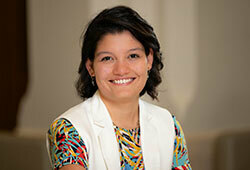
Laura Camila Suárez Rodríguez (Colombia/Costa Rica)
is a young Latin American woman who has worked defending and promoting fundamental rights in the Americas. She recently served as an international human rights accompanier for Peace Brigades International, supporting human rights defenders and civil society organizations in Northern Mexico. Previously, as a consultant for the Central America and Mexico Program of the Center for Justice and International Law, she worked on various initiatives related to human mobility in the Mesoamerican region.
Laura Camila holds a bachelor’s degree in political science and social communication from the University of Costa Rica, where she was awarded a scholarship for academic excellence and graduated with honors. As a student, she was involved in social projects supporting the cross-border indigenous population in Costa Rica and participated in related research projects. She also interned at the Mission to Support the Peace Process in Colombia and worked for the International Organization for Migration in Costa Rica.
At the Keough School, Laura Camila plans to expand her strategic peacebuilding knowledge and continue working to strengthen Latin American civil society. She is the recipient of a Kroc Institute Fellowship.
Jennifer Betz
Assistant Director of the International Peace Studies Concentration
Jbetz2@nd.edu
+1 (574) 631-0934